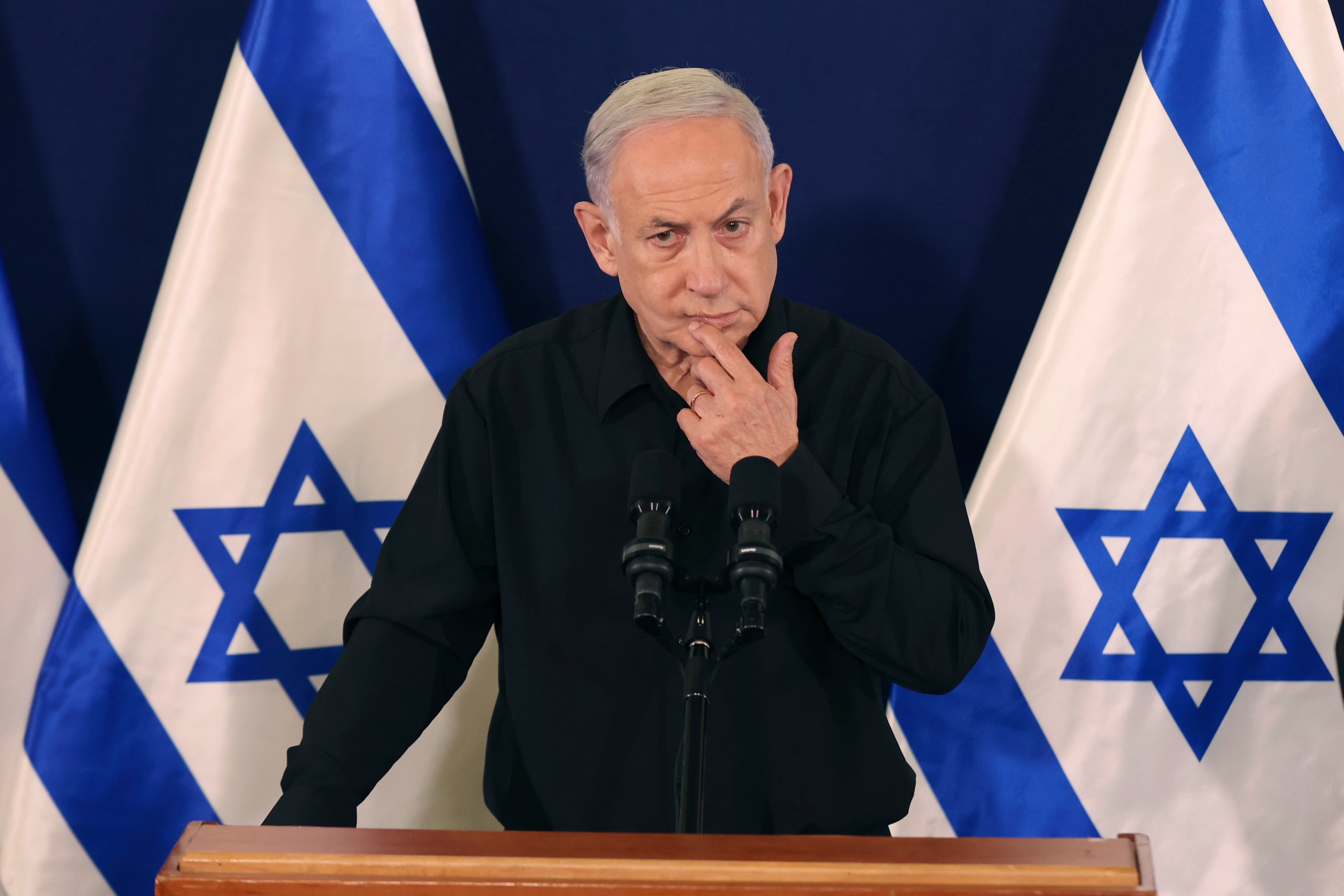Tanks and troops target Gaza City in major escalation of Israel ground offensive
Deeper push into the besieged territory comes as airstrikes continue and aid agencies say humanitarian crisis is worsening as supplies run out
Your support helps us to tell the story
From reproductive rights to climate change to Big Tech, The Independent is on the ground when the story is developing. Whether it's investigating the financials of Elon Musk's pro-Trump PAC or producing our latest documentary, 'The A Word', which shines a light on the American women fighting for reproductive rights, we know how important it is to parse out the facts from the messaging.
At such a critical moment in US history, we need reporters on the ground. Your donation allows us to keep sending journalists to speak to both sides of the story.
The Independent is trusted by Americans across the entire political spectrum. And unlike many other quality news outlets, we choose not to lock Americans out of our reporting and analysis with paywalls. We believe quality journalism should be available to everyone, paid for by those who can afford it.
Your support makes all the difference.Israeli troops and tanks are closing in on Gaza’s main city as the country steps up its war on Hamas.
The military advanced on Gaza City from two directions. They were said to have cut, at least for a time, the main north-south Salah al-Din road south of the city and to be operating on the outskirts of the Zaytun and Shuja’iyya neighbourhoods. Armoured vehicles were also said to be close to the Mediterranean coast in the north of Gaza in an area where Hamas said it was engaged in heavy fighting.
One resident of Gaza City, who asked not to be named, told The Independent that tanks had reached its outskirts but had later “withdrawn again”.
Ghassan Abu Sitta, a British-Palestinian doctor who is treating the wounded in the main al-Shifa hospital in the centre of the city, said: “The thumping today was very loud, the artillery is very, very close.”
The deeper push into Gaza comes after weeks of retaliatory airstrikes that have hammered the territory in the wake of the attack by Hamas that killed more than 1,400 people in Israel. The health ministry in Hamas-run Gaza said that the death toll in the territory had risen to more than 8,300 people killed, including more than 3,400 children.
Video, taken by a local journalist and circulated online, showed an Israeli tank and bulldozer in central Gaza blocking the territory’s main highway, which the Israeli military in recent weeks has suggested Palestinians use to evacuate to the south.
In the video, a car appears to approach an earth barrier across the road. The car stops and turns around. As it heads away, a tank appears to open fire, and an explosion engulfs the car.
The journalist, who is filming in another car, races away in terror, screaming, “Go back! Go back!” at an approaching ambulance and other vehicles.

Hundreds of thousands of Palestinians remain in the north, and would no longer be able to escape if the road is blocked.
The Independent contacted the Israeli military for comment on this. They did not confirm or deny cutting the road but pointed to a statement by Rear Admiral Daniel Hagari, who said infantry and armoured activity had “expanded” in Gaza.
“I will not detail here the positions of our forces even if they are published on social media,” the spokesperson said, adding that the two objectives were to crush Hamas and to bring more than 200 hostages back to Israel.
The military said on Monday evening that they had secured the release of a female soldier during their ground operation. They said private Ori Megidish was back home safely with her family. She has since undergone medical checks and is “doing well”, the military said.
Prime Minister Benjamin Netanyahu said that the ground campaign in Gaza creates the possibility for the hostages’ rescue.
“Hamas will not do it unless they are under pressure,” he told reporters. “We obviously greeted one hostage with open arms after yesterday’s successful action ... but we’re committed to getting all the hostages back home. We think that this method stands a chance.”

However, Mr Netanyahu said in an evening address that Israel “will not agree” to a ceasefire with Hamas.
“Just as the US would not agree to a ceasefire after the bombing of Pearl Harbour or after the terrorist attack of 9/11, Israel will not agree to a cessation of hostilities with Hamas after the horrific attacks of 7 October,” he said. “Calls for a ceasefire are calls for Israel to surrender to Hamas, to surrender to terrorism.”
“The Bible says, ‘there is a time for peace, and a time for war’,” he said. “This is a time for a war.”
When asked if he would resign in the wake of the Hamas attack, Mr Netanyahu said that the only thing he intends to resign is Hamas, adding: “We are going to resign them to the dustbin of history.”
The Israeli military said it had killed four prominent Hamas operatives. “IDF troops killed dozens of terrorists who barricaded themselves in buildings and tunnels, and attempted to attack the troops,” it said in an update.
Hamas shared a video showing three other female hostages in captivity – one of the women begs Mr Netanyahu to agree to a deal where the hostages would be released in exchange for Palestinian prisoners in Israeli jails. They are likely to have given the statement under duress.
Mr Netanyahu condemned the video as “cruel psychological propaganda”. His office named the women as Danielle Aloni, Rimon Kirsht and Elena Trupanov.
The families of the hostages who appeared in the video have just given a press conference.

Remus Aloni, father of Danielle Aloni, said when he saw her picture on television, “my heart nearly stopped beating”.
He said he and his wife breathed a sigh of relief that she was alive. “We are thinking about you every minute, every second. Everything we do, we’re constantly thinking about you and we’re going to bring you back home,” he said.
A young Israeli-German hostage was killed in the Hamas attack on 7 October, her family confirmed on Monday. Shani Louk, aged 22, was initially believed to have been kidnapped alive during Hamas’s assault on the Supernova music festival after she was paraded semi-naked through Gaza, apparently unconscious on the back of a truck.
Ms Louk’s sister Adi confirmed that Shani had died, probably during the attack, after the discovery of human remains that suggested injuries that would not have been survivable. “It is with great sadness that we announce the death of my sister, Shani Nicole Z.L. , who was on October 7, 2023, at the party massacre in Re’im,” Adi wrote on Instagram.
According to reports in the German and Israeli media, a cousin of Louk said that the family received an official notice from the Israel Defence Forces and the voluntary emergency response organisation Zaka that a bone from the base of Louk’s skull had been found and matched with her DNA.

Doctors determined that a person could not live without the bone and concluded that Louk could not possibly still be alive. “I am really sorry to report that we have now received news that Shani Nicole Louk has been confirmed murdered and dead,” Israeli President Isaac Herzog told Germany’s Bild newspaper. “What we saw on the Gaza-Israel border goes far beyond a pogrom. We saw a slaughterhouse.” He claimed: “Her skull has been found.”
Meanwhile, the United Nations said one-third of hospitals in Gaza and nearly two-thirds of primary healthcare clinics have shut down due to damage or lack of fuel. They added that 57 hospitals had been damaged in the bombardment.
Doctors in Gaza and international rights groups reported that at least three hospitals were damaged in the last 24 hours by strikes that were dangerously close including the Turkish-Palestinian Friendship Hospital for cancer patients, photos of which were sent to The Independent.
Supplies were so low, Care International said, that pregnant women were undergoing C-sections without anaesthetic.
“Pregnant women are being forced to undergo emergency C-sections without anaesthetics. I can only imagine how afraid these women are, for themselves and their babies, all while suffering in unbearable pain,” said Hiba Tibi, CARE West Bank and Gaza country director.
Due to the lack of capacity in hospitals, women are being discharged within as little as three hours after giving birth. An average of 160 pregnant women are expected to give birth every day over the next month in Gaza.

Join our commenting forum
Join thought-provoking conversations, follow other Independent readers and see their replies
Comments